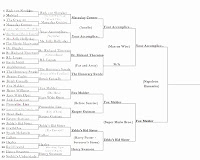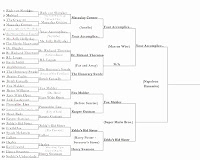Despite the gutsy move to give The Little Mermaid a negative review, it just wasn’t enough for Deems Taylor. So Botch Casually will move on to the next round. For this next battle, we’re looking at the second Hitchcock of the tournament, Rope. And I can say this with honesty: This is one of the battles I’ve been waiting for. I believe this will probably be one of the toughest ones to vote on (depending on what you look for in a review). So read, vote, comment, enjoy! You have until Thursday. Below is the updated bracket. Click to make it bigger.
———————–
Review #1
By Fox Mulder
Alfred Hitchcock crossed the pond to Hollywood in 1940 and consistently stretched the boundaries of genre filmmaking during that decade. Shadow of a Doubt brought a shocking personal element to a small-town mystery, and Notorious took the spy caper to greater heights. While those pictures took chances, he went a step further with Rope in 1948. Comprised of a series of long takes and set in a single location, it boils down the story to its barest essentials. A dinner party has seven attendees, but there’s an eighth participant that’s only known to two of them. While his dead body rests inside a wooden chest in the center of the room, the unsuspecting guests don’t realize they’re celebrating a murder. They’re even being served food from the coffin itself — a cruel joke from a devious killer.
The murderous duo is Brandon (John Dall) and Phillip (Farley Granger), who share the apartment where the party takes place. Earlier that day, David Kentley (Dick Hogan) arrived at their home with no idea he was the subject of a horrid experiment. Could they perform the perfect murder? We learn the specifics of the killing from the start, so there’s no mystery about that feat. Instead, the suspense comes from wondering if anyone will discover their secret. Brandon is the mastermind and believes he’s left nothing to chance, but he can’t resist taking risks. It wouldn’t be any fun if there wasn’t some danger. Phillip is the reluctant accomplice who loses his nerve after the murder. When their sharp former headmaster Rupert Cadell (James Stewart) starts asking questions, even Brandon’s clever plans might not be enough to hide their dastardly deeds.
While Rope’s unconventional style earns the headlines, it’s also a landmark in its depiction of homosexuality. Brandon and Phillip’s relationship is never clarified during the story, but they’re obviously a couple. Arthur Laurents’ screenplay deftly sidesteps an issue that wouldn’t have passed the censors. The writer and both actors were homosexuals, and their characters’ interactions feel like the squabbles of an involved couple. Their relationship is treated like it’s no big deal, an impressive feat for a movie that’s more than 60 years old. When comedies like I Now Pronounce You Chuck and Larry represent our modern culture’s look at homosexuality, we might not be any further along. Brandon and Phillip are murderers, but their sexual preference doesn’t play a role in their evil deeds.
Adapted from the 1929 play by Patrick Hamilton (Gaslight), this film resembles a one-act stage play in style and content. The source material was inspired by the infamous Leopold and Loeb case, and some towns banned the movie because of that connection. An intriguing discussion during the party outlines Brandon’s feelings about the superior man having the right to commit murder. While Rupert considers this issue from a philosophical perspective, it’s clear that Brandon takes it very seriously. These concepts spring from Nietzsche and Rupert’s teachings as their headmaster. He doesn’t realize that his pupils have taken the intellectual discussions to the next extreme. Brandon exudes confidence and acts sinister all the time, so his behavior doesn’t immediately signify a change. Phillip seems angry and frightened, however, so it’s clear that something’s afoot beyond the typical dinner-party shenanigans.
The shooting technique might seem rudimentary today, but it was monumental for the time period. The technical precision required to maneuver the camera through the cramped apartment is remarkable. Late ‘40s technology prevented shots from lasting much longer than 10 minutes, so Hitchcock uses interesting ways to hide the cuts. He zooms into suit jackets or furniture to disguise the switch to a new take. There are a few examples of direct cuts, but they’re barely noticeable because we’re engaged in the plot. It’s an intriguing experiment, but does it enhance the story? That is the pivotal question. I believe this style works and increases the suspense as Rupert starts discovering the truth. The final showdown between the headmaster and his pupils is considerably more powerful because of the lack of cuts. Hitchcock’s approach might feel simple when compared to innovative recent attempts like Aleksandr Sokurov’s Russian Ark or Mike Figgis’ Timecode, but it remains effective.
There are some problems that arise with this approach, however. The 80-minute running time feels strangely long for such a brief film. The story functions like a play and works in that framework, yet it also leads to some tedious moments. The middle segment drags and gets sidetracked by an uninteresting romantic subplot with David’s buddy Kenneth (Douglas Dick) and girlfriend Janet (Joan Chandler). When viewed today, we’re also focusing more on Hitchcock’s tactics than the actual plot. This isn’t his fault, but it makes for a much different experience than audiences had during the original screenings. The film’s experimental reputation makes it difficult to view it from any other perspective.
There’s still plenty to like about Rope, which gets unfairly labeled as a failed experiment. Several performances are excellent, particularly John Dall (Gun Crazy) as the arrogant Brandon. He leaps into the over-the-top role and makes him a believably deranged guy. It’s a theatrical performance that may turn off some viewers, but it works for the material. Stewart is also excellent as the shrewd guy who quickly recognizes something is amiss. Rupert doesn’t fathom the depths of their devilish act but has a curious hunch. Stewart feels he was miscast for the part, and the studio pushed for Cary Grant. I disagree and think he’s the right choice because he conveys smarts with just a glance. You can see the gears churning in his head during each successive misstep from Brandon and Philip. Less successful is Farley Granger (Strangers on a Train), who has the thankless role of playing the weaker part of the duo. He tries his best with the limited role, but we never care about his moral quandaries. The rest of the supporting cast is capable but mostly exist to set up the conflict between Rupert and the killers.
Looking beyond the basic style, Hitchcock finds clever ways to arrange the characters within the frame. He sets up groups in a triangle to convey their thematic relationships. The most prominent example is Rupert standing between Brandon and Phillip while he tries to discover the truth. During the final scene, they hover closely around him and enhance the claustrophobic feeling. While it might seem like Brandon and Phillip are in control, Rupert knows what he’s doing. Hitchcock also uses the triangle set-up to show the ways Brandon tries to manipulate the party guests. He’s like a conductor managing an orchestra, but there’s one player who keeps deviating from the sheet music. When you combine the inventive set-ups of the frame with the capable technical expertise, it makes for a compelling movie. Rope falls short of Hitchcock’s best work but remains must-see viewing for movie fans delving into the master’s deeper cuts.
————————
Review #2
By Remo Williams
In the end, this film was a great introduction to Hitchcock and I highly recommend it for the plain and simple face that it made me want to seek out more of his work. This time, I actually intend to follow through on it. Don’t get me wrong… you can’t teach an old dog new tricks. Films like Prometheus and The Avengers will always get my attention first. However, this film is better than half the standard fair being pumped into cinemas these days. If you have the time, I suggest you use it to check this little gem out.
















Both great reviews, but I went for Mulder, because he/she focused more on the film and less on themselves. I don’t mind the more personal approach to reviewing normally (I do it more than a little myself) but I feel it doesn’t really fit with an anonymous competition. Also, I felt Mulder’s was better researched, and I learned new insights into a film I’ve seen countless times and love.
Tough one. I like the contrast between the styles and I thought both worked. Gave the slight edge to Fox though for the film history perspective. I’d also recommend to Remo not to focus on your newness to older films. It undercuts the review a bit.
And how awesome that this was Fox Mulder vs. Remo Williams!
I found the newness to older films helped sell the review, as you see the great contrast from where he/she was prior to Rope and where he/she was afterwards. To me, that helps to sell the movie on an even greater level. There’s a difference, to me, between reviews and critique. I think reviews should be more personal as they’re about how a film affected you on a personal level as a film watcher.
Though for the record, I’m not choosing favorites here. I said in the opening that both were excellent reviews, and I won’t be shocked about whichever one wins the round. That’s just my reasoning for why Remo’s is worthy of a solid battle.
I really liked both of these reviews as well, so I’m not jumping on Remo for his approach. The only thing I will say, in defense of 100 Years, is that when Remo makes a statement like “Admittedly, this is probably not one of his most suspenseful films,” it lands less solidly, because we know this opinion is coming from assumption rather than knowledge.
Overall, though, I like Remo’s approach. I only gave the edge to Mulder because it was an exceptionally precise and informed article.
For the record, I was not trying to be overly critical of Remo. As I said, I thought both were strong. I think some others have said things more eloquently. I don’t mind him explaining his newness to classic films. I just thought that aspect could have been tighter. This was a very close call for me.
Very good description and analysis of the “one-shot” technique by Mulder. Remo’s review is okay but he/she definitely over-shared.
Mulder is more academic while Remo has a more personal approach to it all. Both are very good in their style but I prefer the Mulder one because he seems like he searched more on his assigned film.
Both very strong! I am not a tremendous fan of Hitchcock, but after reading these, I’ll be adding Rope to my “to-see” list. I agree with the above assessment of Mulder’s academic style v. Remo’s personal approach, and while they were both excellent, Mulder’s ended up resonating more with me, so he got my vote.
Both well-written reviews, but I went for Mulder because his was more informed (he was the only one to mention the Leopold & Loeb connection, for instance).
I thought both reviews were strong so I’m surprised the voting is so uneven. I did go with Mulder though. The aspects included about the depiction of homosexuality and use of triangles in blocking the actors were really interesting and won the vote. I don’t mind Remo’s personal style at all but whenever an anonymous competitor acknowledges the competition it turns me off for some reason.
Yeah, I’m kinda surprised at how uneven it is, as well. I definitely thought we’d have a race to the end on this one, not a clear winner from the start.
I have to agree with most of what’s been said here. Both reviews are very well written and I enjoyed both. Remo’s review, though takes too long to get to the actual meat of it.
i found Mulder’s review to be far too long and a little boring honestly, and found myself scrolling through most of it…although his comments on homosexuality in the film were interesting, it just wasn’t enough to get my vote…Even though Remo’s review was more personal, I don’t agree that he “over shared”…I like his style of writing better…more conversational…an easier read…I thought his honesty about not particularly liking older films only helped his review…
ditto
I agree with a lot of the things said before me, I also gave the edge to Fox, I think it helped that I read his first, which may be the little bit of randomness that could have given the edge to Fox in a tight race. I don’t mind giving personal details, but in the overall scheme of the review, I thought it took a little too long to get around to the actual meat of the review, as well as stepping outside of itself to point out that it is, in fact, a review.
In the end, I think Fox’s review just plain made me want to see the movie more out of the two reviews. Nice work both of you.